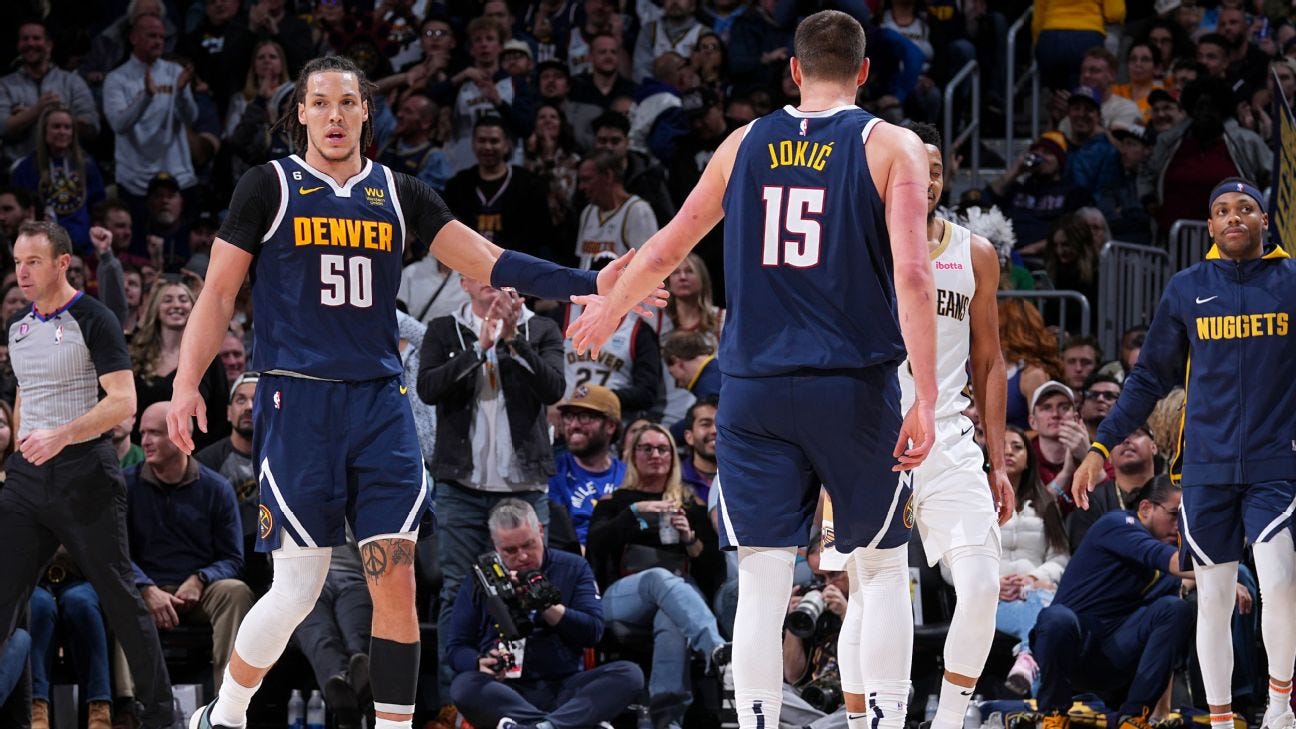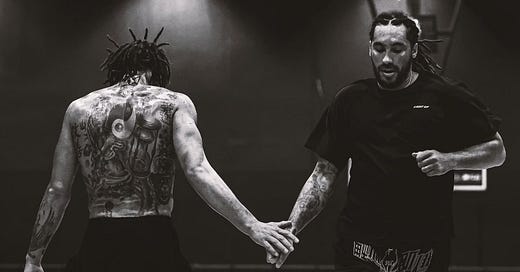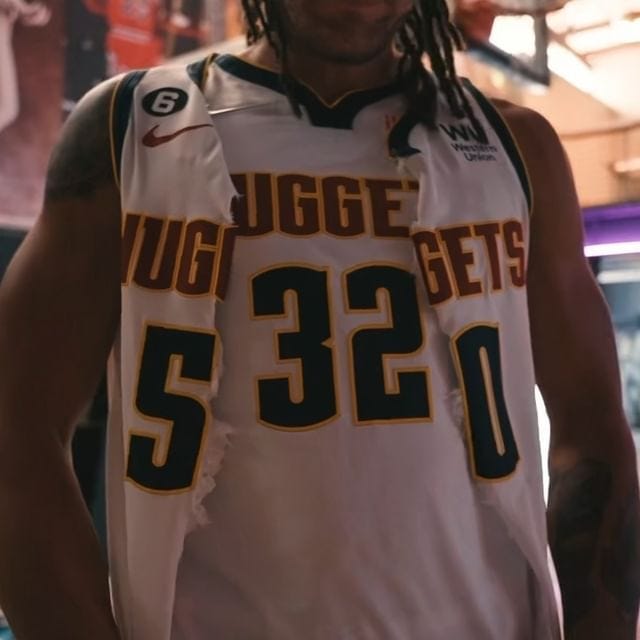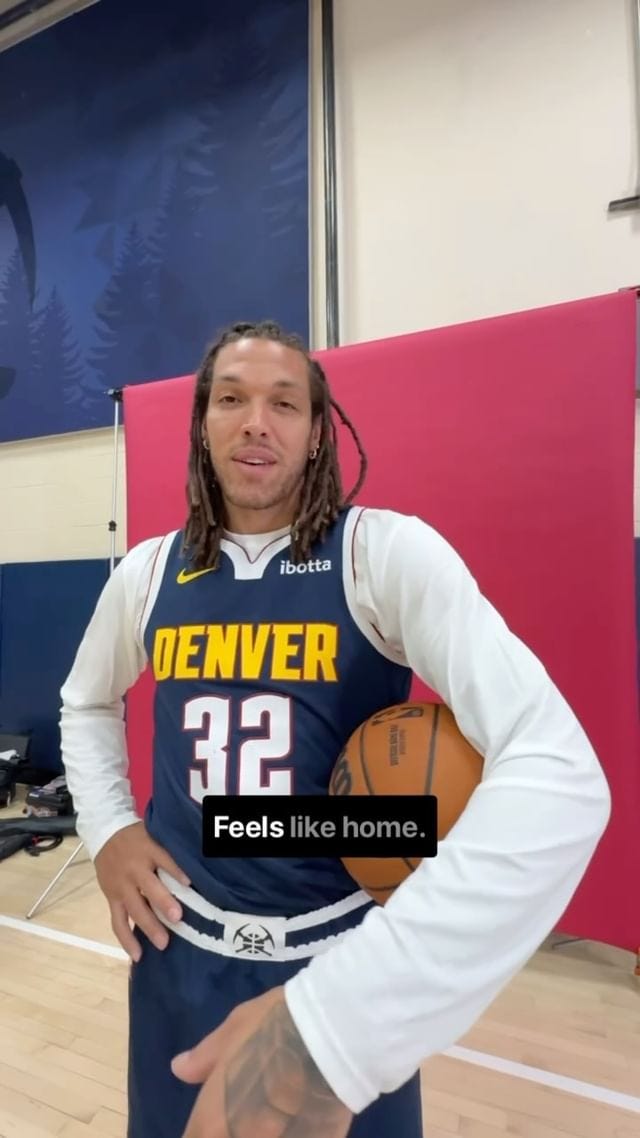When the world gives us every reason to quit, to crumble beneath the weight of our pain, we find ways to keep showing up and bringing meaning to things that should cease to matter.
Something as seemingly insignificant as basketball can become a balm for our greatest losses. At least, it seems to be for Aaron Gordon, the Denver Nuggets’ star forward, whose older brother Drew tragically died in a car crash in late May.
Months later, news outlets reported that Gordon was changing his jersey number from 50 to 32—the same number Drew wore when he played basketball at the University of New Mexico and throughout his international career.
Gordon put his own stamp on the announcement with an Instagram video from his home gym where he dunked and tore open his number 50 jersey upon landing to reveal his new digits.
During Denver Nuggets Media Day, a reporter asked Gordon about the decision to change his number. “I think it was pretty natural,” said Gordon. He shared how many of his family members wore 32 and that it was also an ode to Magic Johnson, one of his dad’s favorite players.
“It was my brother's favorite number, my dad's favorite number, my sister played in it in college, I played in it in high school,” added Gordon. “It feels like home.”
When I named my newsletter Feels Like Home, I didn’t expect to perfectly encapsulate what I was trying to do. But I knew I wanted to write about things I love and the people and moments that have shaped me. Things that feel like home. And I hoped readers might find something in my writing that feels like home for them, too.
While I can’t remember the last time I opened a Bible, the Prodigal Son story still speaks to me—namely its picture of “home.” This idea that we are loved and accepted as we are and can always return to this reality, whether it’s found in a place, people, or things. And when we come home, we’re met with open arms and celebration. It’s where we belong.
Since starting my newsletter, I’ve explored this feeling of Home through my love for music, pop culture, and sports. But I always want to reach for the thing beyond the thing.
At the beginning of last year, one of my first newsletter essays was about Aaron Gordon. Not just Gordon, but the throughline of defiance that connects him and pop music icon Kesha. And not just how rebellion has helped them, but also how resistance is necessary for our own survival.
In the essay, I included how Aaron looked up to his brother Drew as a kid. “My brother could dunk from an early age and I saw that and I thought it was the coolest thing in the world,” said Aaron in a 2016 interview for the Orlando Magic Daily.
“I told him one day that I’m going to be able to jump higher than him,” Gordon continued. “He was like, ‘No, you’re not,’ and I was like, ‘Watch.’ That kind of inspired me.”
Aaron Gordon, who is most known for how he commands the air, took flight on his brother’s shoulders. So, for that reason, and I’m sure plenty more, a number isn’t just a number. Basketball isn’t just basketball. And when Gordon called his Denver Nuggets teammates his brothers, you feel how much weight that word holds.
“I always leaned on my brother,” shared Gordon during his Media Day press conference. Aaron discussed how the relationships outside of his family didn’t always feel as deep. He continued, “Now, I understand that you can’t take any relationship for granted. These guys have been there for me every step of the way. They came to [Drew’s] service. They came to his funeral. These guys have been super supportive of me, and I love them for that.”
Later on, when talking to the media, a reporter asked Gordon what inspires him. “Winning inspires me,” started Gordon. “And what really inspires me is my people, my partners, my team, my brothers. On the days that are hard, that’s what gets me out of bed.”
Gordon listed three-time MVP Nikola Jokić and his new teammate Russell Westbrook, who has played 16 seasons in the NBA and never won a championship, as players he wants to win for. Gordon framed it as “holding up my end of the bargain, so, at the end of the day, these guys win, too.”
There is beauty in our monuments. The shrines we build that beckon us home. For we live under a culture of domination that would have us believe there is no room for joy or art or care or laughter or life. But we unearth the thing beyond the thing, that which makes our pursuits worthwhile.
As Yassmin Abdel-Magied wrote for Hyphen on the topic of committing ourselves to our art:
“Yes, relying on the economic, capitalistic model of financial value is the default, but we have to find other ways of valuing our art in a world that constantly delegitimises it, if we are going to continue to create.”
As I think about writing, I consider how many of us were taught to fantasize about publishing careers in a world that doesn’t exist anymore. As this work has become less lucrative, we’ve been forced to examine why we do it in the first place and what our writing practices must look like if book deals are less accessible and article rates don’t match the work that goes into them.
I see my newsletter as building a body of work I’m proud of. I made a book for my grandma I have no intentions of selling because honoring myself and my people is what keeps me returning to the page. I don’t care if it’s bad capitalism; I write at the pace of my own pleasure because I want to be good, and I want my people to be good.
“Each of us will have a different sense of why our creative output is worth our time, efforts and attention,” explained Abdel-Magied. “Understanding the why, returning to it on a regular basis, for ourselves as much as for anyone else, is a key part of sustaining ourselves through these wild times.”
On Fousheé’s latest album single “feel like home,” she sings:
“I'm grasping onto the only thing that feels like something, anything
Let's bite the bullet, fight this war together”
Our whys are what make the insignificant significant—things worth grasping onto. Grandma Gwen called any opportunity to eat with her people “a party” because it wasn’t just a meal; it was a celebration of the love surrounding her. When Aaron Gordon got his brother’s initials tattooed on his chest, he saw it as Drew living through him.
We tell ourselves stories to keep going. And along the way, we learn we’re not alone. We join with others—an invitation to look despair in the face and fight hopelessness together.

As Aaron Gordon and Nikola Jokić became a championship duo, Drew saw similarities in how they approached the game of basketball. “They are very like-minded in a lot of different ways that work in harmony,” said Aaron’s older brother.
Basketball aside, one of the things Aaron and Nikola have in common is that they are both the youngest brothers in their families—or as Gordon put it, “We’re both baby boys.” Jokić told Yahoo Sports, “I think just having brothers, you share things. It helps you grow up, and it helps you become a good man.”
At the end of this upcoming NBA season, Gordon envisions himself sharing the Larry O’Brien trophy with Jokić and his other teammates, who have become brothers for him. And amid the waves of grief, Gordon can look to his heart and the guys around him for reminders to keep showing up. The things he loves and the people and moments that have shaped him.
My newsletter Feels Like Home is a collection of things, people, and moments that compelled me to return to the page—that occupy a sliver of the world and became my whole world for a moment in time. I dare to believe these stories are worth telling and can help us find home in one another. Because our burdens weigh heavy, but we lighten the load together.
Thank you!
I appreciate you reading! If you enjoyed, please share it with someone special.
Was this forwarded to you? Sign up here to receive my next newsletter directly in your inbox.
Support the newsletter: If you’d like to support my work, consider becoming a Paid subscriber to Feels Like Home or simply buying me a coffee.
Stay connected: For more content and updates, visit my website or follow me on Instagram, Threads, and LinkedIn.









Beautifully written. Thanks for sharing, Alex!
You absolutely killed this piece bro 🥹
The way you wove your personal journey with the Aaron’s experience has me inspired.